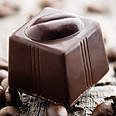
International chocolate manufacturers eye Israeli market
Israeli chocolate market to grown by 5%-10% this year; consumer boycotts could mean greater market share for foreign companies
The Israeli chocolate market is expected to grow at a rate of 5%-10% in value this year, having grown by almost 40% over the last five years in the same terms, the Wall Street Journal reported, citing a study conducted by the UK's Leatherhead Food Research.
The past year's consumer boycotts, which have been targeting local food manufacturers due to what protesters consider exorbitant pricing, could make Israel all the more attractive for foreign chocolate companies.
The Israeli market serves as a gateway for international firms wishing to enter the Middle East, according to Leatherhead analyst Jonathan Thomas.
Over the past month, Nestle stepped up ts investment within the Jewish state by buying a 4.99% stake in the Israeli manufacturer Osem – putting its ownership share of the company at 58.76%. Nestle has been in control of Osem since 1995.
Meanwhile, Kraft Foods Inc. widened the array of products sold in Israel over the course of 2011, especially products under its Milka label. The company said that it is planning further growth in the Israeli market, both with Milka and its other brands.
"The growth in Israeli chocolate consumption has been fueled by two main factors – health and indulgence," Ika Cohen, owner of Ika chocolate boutique in Tel Aviv, told the WSJ. "Both factors have had an extremely positive impact on chocolate sales despite the global economic downturn."
Keith Flury, a senior soft commodity analyst for Rabobank, noted that the increase in Gross Domestic Product is closely linked to the consumption of cocoa-derived products.
"Companies see a growing nation like Israel and want to sell them consumer goods such as cereal and ice cream, both of which increase cocoa demand," he said.
One major contributor to the increasing sales of foreign-made is the social protest movement which has been gaining traction in recent months. The protest measures include a boycott of Strauss, the leading Israeli manufacturer that has been repeatedly accused of overcharging for its products.
"If more consumers turn away from the market leader Strauss to international confectionary companies, these international entrants will see this as an opportunity to invest and acquire market share," said Mr. Thomas.










